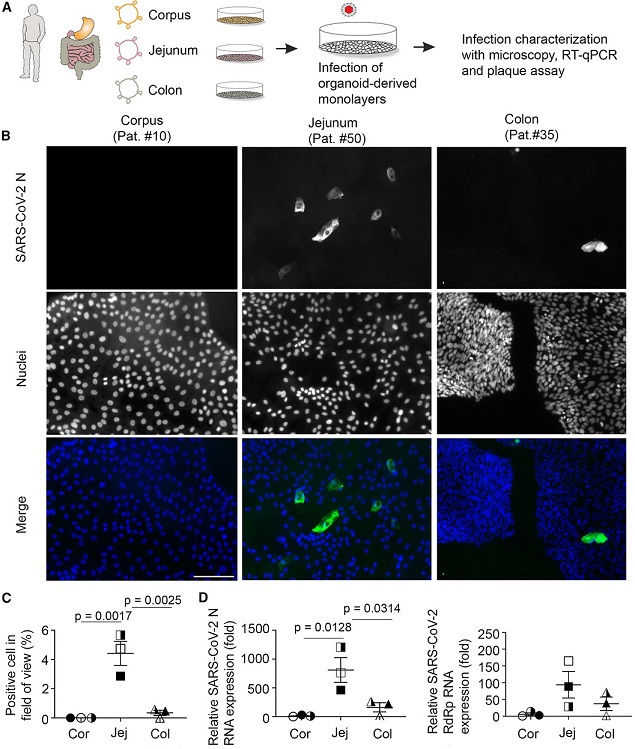Nikhil Prasad Fact checked by:Thailand Medical News Team May 20, 2024 1 year, 8 months, 1 week, 4 days, 3 hours, 48 minutes ago
COVID-19 News: Severe acute respiratory syndrome coronavirus 2 (SARS-CoV-2), the virus responsible for the COVID-19 pandemic, has a knack for targeting specific cells within the human body. While its primary assault is on the respiratory system, it also wreaks havoc on the gastrointestinal (GI) tract, causing symptoms like diarrhea and vomiting. Intriguingly, recent research shows that while SARS-CoV-2 can robustly infect cells within the intestines, it cannot do the same with the stomach. This fascinating phenomenon has been linked to the presence or absence of a crucial receptor known as angiotensin-converting enzyme 2 (ACE2).
 SARS-CoV-2 infects small intestinal and colonic, but not gastric, organoid-derived monolayers
(A) Scheme of experimental setup. Organoid-derived monolayers were differentiated for 4 days before incubation with 1 × 106 PFU of SARS-CoV-2. The infection was characterized 24 hpi. (B) SARS-CoV-2 nucleocapsid (N) protein (green) stained by immunofluorescence. Nuclei were stained with Hoechst 33342. Scale bar, 100 μm. (C) Quantification of the staining shown in (B). Ten images were quantified per donor.
A Collaborative Effort
SARS-CoV-2 infects small intestinal and colonic, but not gastric, organoid-derived monolayers
(A) Scheme of experimental setup. Organoid-derived monolayers were differentiated for 4 days before incubation with 1 × 106 PFU of SARS-CoV-2. The infection was characterized 24 hpi. (B) SARS-CoV-2 nucleocapsid (N) protein (green) stained by immunofluorescence. Nuclei were stained with Hoechst 33342. Scale bar, 100 μm. (C) Quantification of the staining shown in (B). Ten images were quantified per donor.
A Collaborative Effort
The research, conducted by a team from Julius Maximilians Universität Würzburg, Charité - Universitätsmedizin Berlin, Technische Universität Berlin, University Hospital Würzburg, Freie Universität Berlin, The Francis Crick Institute in the UK, and the University of Oxford, delved deep into this mystery. Their findings were published in a detailed study that is covered in this
COVID-19 News report, highlighting the virus's preference for the intestines over the stomach.
Understanding SARS-CoV-2 Tropism
The term "tropism" refers to the way a virus targets specific cell types. For SARS-CoV-2, its ability to infect a cell largely depends on the presence of the ACE2 receptor, which acts as the virus's entry point. ACE2 is abundantly present in the cells lining the small intestine and colon but is notably absent in the stomach's cells. This difference in ACE2 expression is what makes the intestines a hotbed for viral replication, while the stomach remains relatively unscathed.
Investigative Techniques: Organoids to the Rescue
To uncover these insights, the researchers used advanced in vitro models known as organoids. These are three-dimensional cell cultures derived from stem cells that mimic the structure and function of actual human organs. By growing organoids from different parts of the GI tract - specifically the stomach (corpus), small intestine (jejunum), and colon - they were able to observe how SARS-CoV-2 interacts with these tissues.
The team infected these organoid-derived monolayers with SARS-CoV-2 and monitored the viral infection. Their observations were striking: while the virus thrived in t
he jejunal and colonic cells, it failed to infect the gastric cells. This clear distinction was attributed to the presence of ACE2 in the small intestine and colon, and its absence in the stomach.
ACE2: The Gatekeeper
Further investigations confirmed that ACE2 is indeed the limiting factor for SARS-CoV-2 infection. By ectopically expressing ACE2 in gastric organoids - essentially introducing the receptor into stomach cells where it is not usually found—the researchers were able to make these cells susceptible to infection. This experiment solidified the role of ACE2 as the key determinant of viral tropism in the GI tract.
Clinical Relevance
The findings have significant implications for understanding the pathology of COVID-19. Approximately 10% - 30% of COVID-19 patients experience GI symptoms, and the virus has been detected in stool samples, suggesting that the intestines play a critical role in the disease. The study's results indicate that while the stomach is largely protected from SARS-CoV-2 infection due to the absence of ACE2, the small intestine could serve as a major site for viral replication and possibly even transmission.
Broader Implications
This research contributes to the broader understanding of how SARS-CoV-2 interacts with the human body and underscores the importance of ACE2 in viral infections. The insights gained could inform future studies and help develop targeted therapies or preventive measures against COVID-19 and other similar viral diseases.
Future Directions
The study opens up several avenues for future research. One area of interest is the variation in ACE2 expression across different age groups and how this might affect susceptibility to infection. Previous studies have shown that ACE2 levels might be higher in pediatric and fetal tissues compared to adults, suggesting age-related differences in infection patterns.
Another important aspect to explore is the potential role of other receptors and co-factors in SARS-CoV-2 infection. While ACE2 is the primary entry point, other proteins like transmembrane serine protease 2 (TMPRSS2) and Neuropilin 1 (NRP1) also play roles in facilitating viral entry and could influence infection dynamics in different tissues.
Conclusion
The study conclusively demonstrates that SARS-CoV-2 can infect cells within the intestines but not the stomach, primarily due to the presence of the ACE2 receptor. This discovery adds a crucial piece to the puzzle of COVID-19 pathogenesis and highlights the intestine's significant role in the disease. As we continue to combat the pandemic, such insights will be vital in developing more effective strategies to manage and prevent the spread of the virus.
The collaborative effort of researchers across institutions has provided a clearer understanding of the virus's behavior within the GI tract, paving the way for future discoveries that could ultimately lead to better outcomes for patients worldwide.
The study findings were published in the peer reviewed journal: Stem Cell Reports (Science Direct).
https://www.sciencedirect.com/science/article/pii/S2213671124000833
For the latest
COVID-19 News, keep on logging to Thailand Medical News.
